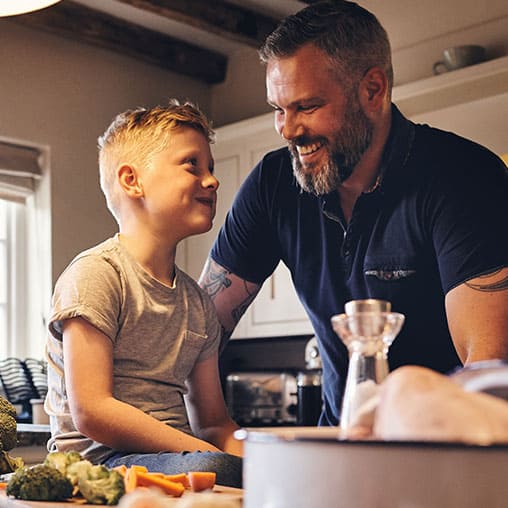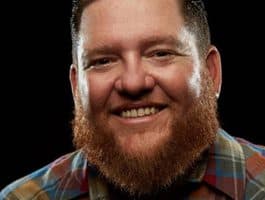
Healing From Sexual Abuse
Brother and sister Jessica Thompson and Joel Fitzpatrick explain why it's important to talk to your children about sex. Joel talks honestly about the sexual abuse he suffered at the hands of a distant family member, which began around the age of 6, and the shame, confusion, and guilt it caused in his heart. Though the abuse did skew his thinking about sex, Joel tells how God renewed his mind and redeemed his pain.
Show Notes
About the Guest
-
- Mom, Dad...What's Sex? by Jessica Thompson and Joel Fitzpatrick
- FamilyLife’s Art of Parenting™ video series
-

Jessica Thompson
JESSICA THOMPSON is an author of several books including Give Them Grace: Dazzling Your Kids with the Love of Christ and frequent conference speaker. She is part of the podcast Front Porch with the Fitzes, and is the director of church life at RISEN Church in San Diego, California.
Joel Fitzpatrick
Joel Fitzpatrick has served as an ordained minister in the Presbyterian Church in America with a focus on youth and family. He received his MDiv from Westminster Seminary California. He is the co-author of Mom, Dad . . . What’s Sex? and contributed chapters to The Sinner and Saints Devotional: 60 days in the Psalms. Fitzpatrick lives in Southern California with his wife and their two children.
Siblings Jessica Thompson and Joel Fitzpatrick explain why it’s important to talk to your children about sex. Joel talks honestly about the sexual abuse he suffered at the hands of a distant family member.
Healing From Sexual Abuse
Bob: Joel Fitzpatrick was sexually abused when he was a child. Now, as an adult, he has looked at this phenomenon and wants to make sure his own kids are prepared and protected.
Joel: Abuse happens with people, who you’re close to. It’s not just some brand-new person off the street; it’s someone who you’re close to—it’s someone your kids are close to. Really defining that well for your kids helps to protect them. I mean, it’s not the panacea—right?—it’s not the thing that’s going to keep them from ever having somebody abuse them. But what it does is—it helps them.
Bob: This is FamilyLife Today for Tuesday, April 9th. Our hosts are Dave and Ann Wilson; I'm Bob Lepine. Sexual abuse is not a new phenomenon—it’s been around since the beginning of time. And yet, it’s something, as parents, we want to be alert to and do all we can to make sure our kids are protected. We’re going to talk more about that today. Stay with us.
And welcome to FamilyLife Today. Thanks for joining us. We’re talking about one of the challenges we have as parents. But honestly, Dave and Ann, this is one of the great privileges we have, as parents, to be able to introduce our kids to one of the good gifts God has given us, as human beings, and to help them understand it in a wholesome, and healthy, and biblically-saturated/gospel-saturated way. We’re talking about human sexuality. A lot of parents are scared to death of this subject.
Ann: I was going to say—I think parents—we are petrified—
Bob: Yes.
Ann: —because we don’t know all of the answers. We don’t know what our kids are facing, and this generation feels very different from the one we grew up in.
Dave: And I would add this—I was excited, as a new dad, to get this opportunity. Was I scared?—oh, yes. Did I know what I was going to say?—not really. But I never had a dad—never had a conversation with my dad about this ever, until maybe college, when he said, “Yes; get as many women as you can and have a good time.”
Bob: Wow.
Dave: That’s what I did. That’s like one of the first conversations I can remember—I’m 20-some years old.
You know, as I became a new dad, I remember having that thought: “Oh my gosh! The day’s going to come when I get the privilege,”—like Bob said, “It’s a privilege,”—yes. Do I know what I’m going to do?—no; but I will figure it out by the time he’s six years old, and we can go to that field and talk about it. [Laughter] I was just like—it was fearful; but it was also very exciting to think, “I get to be the one to bring truth in a world of lies about a very important subject.”
Bob: We’ve got a couple of friends joining us today. They’re back to talk about this subject. Jessica Thompson and her brother, Joel Fitzpatrick, are joining us. Welcome guys.
Joel: Thank you.
Jessica: Glad to be here.
Bob: Jessica—our listeners know from her involvement in the Art of Parenting™ video series. She and her mom have written some books, together, and have been guests before on FamilyLife Today. Joel’s first time here; and this is your first book,—
Joel: Yes; it is my first book; yes.
Bob: —written with your sister. You thought, “Let’s write a—
Joel: Yes; “Let’s just dive right in the deep end. [Laughter] Let’s just be as awkward as we possibly can be.” [Laughter]
Bob: The book is called Mom, Dad…What’s Sex?: Giving Your Kids a Gospel-Centered View of Sex and Our Culture.
We’ve got to start off here; because Joel—for you to dive into this subject—brings up some pain from your past.
Joel: Yes; it really does. As I was growing up, there was a family member—let me just say—if you’ve got kids now, and you’re in the car with kids, then we’re going to kind of dive into the deep end a little bit here; so just be aware of that.
As I was growing up, there was a family member—not in my immediate family/kind of distant family, as usually is the case—who molested me over a period of time/multiple years, and it was hard. So like, growing up with that, there was a lot of shame around this topic.
Bob: What age did this start?
Joel: It started when I was around five/six—something like that—went until I was about eight.
Bob: Did you feel that sense of shame, right away, as a five-year-old?
Joel: Not right away; no. It was weird, and it was awkward. I didn’t—like I knew what was going on was wrong. You know, there’s that sense in which it’s like, “Well, I think other people know about this; so it must be like—like I don’t know what to do with this.”
This is something that parents need to talk to their kids about in a real way. Shame that’s brought onto a person, because of the violation that’s been done to them, is a real danger when it comes to this topic; because you think to yourself—like, “I’m broken now”; right? This is a lot of the problem with the way that people have talked about sex and sexuality in the past.
For me—hearing: “Having sex makes you broken,” “It makes you dirty,”—I’m like: “Well, what about me? This wasn’t something that I went and looked for. This is something that was done to me by someone else, and does that mean that I’m broken? Does that mean that I’m dirty? Does that mean that I’m shameful to God?”
Ann: I think I can relate to that, because I have abuse in my background. There was a point where, not right away but after a while, I thought: “It must be me. There must be something wrong with me.” It almost like transferred, and it just kind of locked into my heart. I don’t think, as kids, we know what to do with that.
Joel: No; and when you’re told that sex is wrong, and sex is bad, and sex is a sin—and then that happens to you—the question is: “What do you even do with that?” I carried that—I still carry it—and praise God, when those thoughts of shame and guilt come up in me, praise God for the forgiveness of Christ; right? Praise God for a pastor, who looks at me every Sunday and pronounces, from the pulpit, that my sins are forgiven because of the work of Jesus for me. It still makes me cry every Sunday/still makes me weep; because I’m like, “Wow, could this really be true for me?”
I think another important thing to say—and we bring this up in the book—is that, when stuff like that happens to you, like those are the sorts of people that Jesus uses to build His Kingdom.
Ann: Yes; yes.
Joel: You know, you just read the biblical storyline, and it’s like sexual sin doesn’t disqualify you from being used by Christ to build His kingdom. That’s such an important thing for parents to say to their kids. You see—what shame does—is shame makes you hide.
Dave: Yes.
Ann: Good point.
Joel: Shame makes you say—like, “This needs to be in the dark.” And what the gospel does is—the gospel comes in and just cranks on the spotlights. It exposes everything, and then Jesus takes it away. That gives you real freedom to do that.
Bob: When did this come to light with your family and your friends?
Joel: It came to light a couple of years after it stopped. The person who did this got sent away. You know, but God providentially brought him back into my life while I was a pastor. I’m walking in on a Saturday morning, thinking to myself: “I’m just going to church. No one is going to be here. I’m going to hang my seminary degree on the wall. [Laughter] I’m going to study my Bible and like really live into this pastor thing and lean into that.”
And there’s the guy—just at the door of the church. I invited him into my office. He and I sat, and we talked. I had to confront that all over again, inside of me, saying all of those—like all that anger, all that fear, all that shame, all that guilt—it just all came bubbling right back up to the surface again.
Bob: Was he there to repent?
Joel: No, no; he wasn’t.
Bob: Wow!
Joel: He was looking for a friend; so he thought he’d come to this church, where I was just the pastor at. You know, God’s providence is a funny thing—it kind of exposes areas where you still need to do some business with Jesus. You know, I sat across the desk from him—he was sitting on my couch—I was sitting in my office chair, desk in between us.
I had a really good chance, at that point, to minister the gospel to him and just say: “Look, the only thing that’s keeping me from climbing over this desk and killing you is knowing that Jesus loves me and knowing that I’ve done things against Christ that would deserve eternal damnation. And yet, He forgives me; and He would forgive you, too, and so would I, if you’d just asked. If you ask and you place faith in Christ, then He’ll forgive [you] for all the things that you’ve done—not just to me—but to a lot of people.”
He couldn’t even squeak out an “I’m sorry.”
Bob: Wow.
Joel: He couldn’t even—he didn’t even admit to doing what he did to me. At which point, I just said: “Well, you know, there’s not a lot that we have to talk about. I’d just appreciate it if you don’t come back here, because I need that distance from you.” That’s a hard thing to do.
Dave: How did God renew your mind about sex?—because you start the book with this biblical God design of sex, which is a beautiful thing. That’s where you start the book.
Joel: Yes.
Dave: And yet, you come from the other side of that—the dark side—and to internalize that now, how’d you get there?
Joel: Yes; long time/long time—faithful pastors/faithful friends, who I’ve had this conversation with; faithful parents, who have loved me through this; a faithful sister, who has been my friend through it; and then, really—really starting to say: “I don’t want my kids to grow up with this same view as me. I don’t want the kids in my youth group to grow up with the same view as me.”
So, through all of that—through really reading Scripture, reading a ton of books, talking to my seminary professors about this, talking to my wife about this—I have a beautiful godly wife, who has helped me, so many days, as I’ve been down, thinking about this stuff—really being open with it. What that does is—it allows you to actually process the feelings that are going on inside of you.
This is why I would say: “Men, you need friends. You need good, good friends, who will ground you in the gospel—who will bring you back to that over and over again.” “Women, you need good friends, who will do that for you.” Because quite frankly, if we take what Jesus said seriously—in the Sermon on the Mount: that if you lust, you’ve committed adultery—if we take that seriously, there’s not one of us, sitting at this table or anywhere in the world, that isn’t broken, sexually.
Ann: So true.
Joel: Once we all kind of like say that—right?—then, we can start to talk about it. I mean, start to share the gospel with each other. We can say things like: “Yes; Joel, you’ve been molested; but praise God—Jesus is pure in your place; Jesus is holy in your place. While this wasn’t your choice—Jesus hates that [evil done against you]. He died to make you pure; He died to make you clean; He died to wash you. One day, this will be completely passed from you—you won’t ever have to think about this again.”
Bob: You know, we’re talking to tens of thousands/maybe, hundreds of thousands of people, right now, who have had the experience that you’ve had—
Joel: Yes.
Bob: —and who are reliving some of that as they hear you talk about this. Everybody we’re talking to—and this is where it gets back to the point that you made—everyone we’re talking to would say that “There’s brokenness in my sexuality and in my past.” We all have memories of actions, or thoughts, or whatever, where we’d say there’s shame attached to that/there’s guilt attached to that.
If there’s not a gospel, that will sink you; but because there is a gospel, the worst shame that anyone can feel—I’ve shared this with friends before: one of my favorite hymns that we sing at our church—it’s the great hymn, Before the Throne of God Above. I love the second verse that says:
When Satan tempts me to despair,
And tells me of the guilt within,
And that happens to us; doesn’t it?
Upward I look, and see Him there
Who made an end to all my sin.
Because the sinless Savior died,
My sinful soul is counted free,
For God the just is satisfied
To look on Him and pardon me.
That good news brings liberation, and hope, and freedom, and the ability to function with joy in an area that, otherwise, we could be shut down completely.
Because this is the thing—when I’m talking to people, where this has been a part of their experience—one of two things: They either shut that side of their life off and say, “I’m not going near there,”—they get repressed; they get cold. Even in marriage, they don’t want anything to do with sexuality. Or they get promiscuous to try to anesthetize/try to kill the shame by overindulging.
Joel: Right.
Bob: Neither of those work—both of those are destructive. The only thing that works is to remember the gospel in the midst of this.
Dave: And as you’ve said, the only way the gospel can be applied is—you’ve got to be honest with God and yourself, to say: “I’m going to go there. I’m not going to stick it in a lockbox. I’ve got to step into it.”
I think it would be interesting to hear your [Jessica’s] perspective. What did you see?
Ann: —and even his healing process.
Dave: How did the gospel become real in his life?
Jessica: So what I’ve seen in Joel is this—I’ve seen Joel believe in the love and acceptance of a good Father. I have seen him push through this difficulty and, even, to write about it in the book. I know, when I first saw—when we were writing, back and forth—and I first saw that, I was like, “Oh, okay.” It was a bit surprising to me, because it’s so painful to open that up.
What I’ve seen in Joel is that what he says—when he says: “The gospel is for the broken. The gospel is for the abused and the abuser,”—I know he believes that. I know that he has seen that to be true—that Christ comes to the abused and the abuser. I mean, you look up the story of David and Bathsheba.
Joel: Right.
Jessica: Christ comes for the one, who took advantage, and the one who, was taken advantage of.
Joel: Right.
Jessica: I’ve seen that healing in his life—it’s not a one-day thing. This is a life-long process of believing that truth over, and over, and over again. And that’s what I’ve seen in Joel.
Joel: Yes; I think it’s really important to say that—if you’re listening to this and you’ve been abused/that if you are an abuser—that God loves you. Like your past doesn’t define who you are. Christ’s righteousness defines who you are—God gets to do that.
Thankfully—like you were quoting in the song—when God looks at us, He sees Jesus. He doesn’t see Joel and all the ways that I reacted to it that were both—well, all of them were pretty unhealthy; and then, some that were healthy—He doesn’t see that. What He sees is His child, who He loves and who He is well-pleased with. That’s how God sees you, dear friend—dear brother and sister.
God sees you, and He loves you deeply. It pains Him what happened to you, but He hasn’t left you alone. What He did was He sent His Son to die to prove His love for you. God Himself—the Son/the second person of the Trinity—died to prove His love for you, and there’s nothing that’s going to separate you from that. It’s like Romans 8 has become kind of my life chapter; right?—no condemnation. God uses even terrible things; but yet, there is nothing that is going to separate you.
If you’ve been molested or raped—or abused in those ways—if you’ve been abused physically/verbally—nothing separates you from God’s love—not even your reaction to those things that have happened to you. God loves you. Your Father loves you and have hope—have hope—know the gospel is true for you.
Jessica: Right; and those things don’t make you “less than…”—you’re not “less than…” because those things happened to you.
Bob: And you’re not disqualified from talking to your kids—back to the big picture—
Jessica: Absolutely.
Bob: —because I think a lot of parents, who have had whatever broken sexual experience, think, “I can’t talk to my kids about this,” or “The shame is so great.” Did you feel any of this?
Ann: Well, I was going to say, Bob—I think what I did was I became almost paranoid—
Joel: Right.
Ann: —of not wanting my kids to experience that. Joel, how did you face that?
Joel: Yes; I mean, once again, I have a great lovely wife, who helps to temper me. I have a very, very—like full-force personality—so she helps in that a lot.
I’ve had real frank conversations with them [his children]. I’ve told them, “This is who is allowed to touch you in these circumstances.” A book, God Made All of Me, by Justin Holcomb—
Bob: —which, by the way, is a book we’ve got available in our FamilyLife Today Resource Center; so listeners can get a copy of it. It’s a great book for parents to read to kids.
Joel: Yes; and really helps to set those boundaries, because you don’t even think you need to talk about that sort of stuff—but the reality is—you do.
So often, I think that abuse happens with people, who you’re close to—it’s not just some brand-new person off the street—it’s someone who you’re close to. It’s someone your kids are close to. Really defining that well for your kids helps to protect them. I mean, it’s not the panacea—right?—it’s not the thing that’s going to keep them from ever having somebody abuse them. But what it does is—it helps them.
And then, also, saying, “If somebody ever does this—even if they threaten you, even if they threaten me, even if they threaten your mother—come talk to us about it.”
And pastors—please, please call the police; let the authorities deal with this—
Bob: Yes.
Ann: Absolutely.
Joel: —that’s what they do. If the person is innocent, then God bless them—they’ll be found to be innocent, and fantastic. And if not, then, that’s why God gave us the state; right?—to protect us.
Ann: Thanks—
Dave: Joel—let my wife go first. [Laughter]
Ann: Joel, I just wanted to thank you for sharing that, because it goes unspoken. So many people live in shame, and it still hasn’t come out; so thank you for bringing it up.
Joel: Yes; you’re welcome.
Dave: And it’s interesting—we are one—I was going to say the exact same thing. It took courage, not only to address it in your life, but then to write about it and, now, to speak about it.
I would also say this to anyone that is thinking this, right now: “I’m so broken. God’s never going to use this part of my life. It’s just going to be my little secret. I’m just going to keep it there.” God uses our woundedness to heal and then it becomes a gift—I mean, you didn’t write a book about being a youth pastor; you wrote a book about sex.
Joel: Yes.
Dave: And that comes out of the pain that God said: “I redeemed it. Now, I’m going to use it as a gift to help redemption in other people.” So thanks for that.
Bob: And I think a lot of moms and dads are going to benefit from your transparency—but also, from your wisdom and your focus—as they think through: “How do we have these conversations with our kids about all the issues we face when it comes to sexuality?”—not just the potential for abuse—but “What does healthy sexuality look like? How does the gospel factor into that?”
We’ve got copies of your book, which is called Mom, Dad…What’s Sex? You can go to our website, FamilyLifeToday.com, to request your copy; or call 1-800-FL-TODAY. Again, the title of the book: Mom, Dad…What’s Sex?:Giving Your Kids A Gospel-Centered View of Sex and Our Culture. You can order it from us, online, at FamilyLifeToday.com; or you can call to order at 1-800-358-6329—that’s 1-800-“F” as in family, “L” as in life, and then the word, “TODAY.”
You know, this subject is a difficult subject to address. I know, for a lot of families, this is very real/very personable. Our goal, here, at FamilyLife Today is to try to bring Jesus and the gospel to bear on what are often the painful issues we face in marriage and family. We want to provide practical biblical help and hope for whatever it is you’re dealing with in your marriage and family relationships.
We’re able to do that because listeners, like you, say, “This is important—not only for us—but for others, here, in our community and all around the world.” You make this ministry possible. Every time you make a donation, you’re extending the reach of FamilyLife Today. We want to say, “Thank you for your support of this ministry.”
In fact, right now, if you can help with a donation, we’d love to express our thanks by sending you Dave and Ann Wilson’s new book, Vertical Marriage. It’s our thank-you gift to you when you support this ministry with a donation of any amount. You can donate, online, at FamilyLifeToday.com; or call 1-800-FL-TODAY to make a donation. We’re grateful for your ongoing support of this ministry.
Well, our conversation with Joel Fitzpatrick took a little different turn than we had expected—a sober discussion on a difficult subject. The President of FamilyLife®, David Robbins, is here with us. These are important conversations for us to have.
David: Yes; indeed. I think the thing that stood out to me today is how amazing it is that God is using Joel in such a profound way to speak to others out of his own story—a horrific, evil story that he has experienced—but yet, in his own journey of being healed, and reconciled, and experiencing forgiveness—he is ministering to others.
Bob: That’s 2 Corinthians 1; isn’t it?
David: Yes; I mean, God, as He comforts us, He gives us the ability to comfort others with that same comfort we have experienced. And this is what God, in His grace, does again and again.
Perhaps you’re processing Joel’s story through the lens of your own pain. I simply want to first say: “I’m sorry for your pain—it’s legitimate.” But I also want you to know that your woundedness is not the end of the story. We know from God’s Word—illustrated over and over, in the lives of Moses, and Jacob, and Joseph, and Ruth, and Esther, and David, and Paul, and today, in Joel’s story—that God takes sobering pain, caused by sin, and He transforms it to bring restoration and life to others. God is more than able to do that for you and me today.
Bob: Beauty from ashes; right?
David: That’s right.
Bob: That’s good. Thank you, David.
Tomorrow, we’re going to continue the conversation about how, as parents, we should engage with our children around the issue of sex so that we help them think, biblically, about what’s ahead for them. I hope you can be with us for that.
I want to thank our engineer today, Keith Lynch, along with our entire broadcast production team. On behalf of our hosts, Dave and Ann Wilson, I’m Bob Lepine. We will see you tomorrow for another edition of FamilyLife Today.
FamilyLife Today is a production of FamilyLife of Little Rock, Arkansas; a Cru® Ministry. Help for today. Hope for tomorrow.
We are so happy to provide these transcripts to you. However, there is a cost to produce them for our website. If you’ve benefited from the broadcast transcripts, would you consider donating today to help defray the costs?
Copyright © 2019 FamilyLife. All rights reserved.
1
Episodes in this Series

Being Intentional With Your Kids

Dad: A Godly Model


